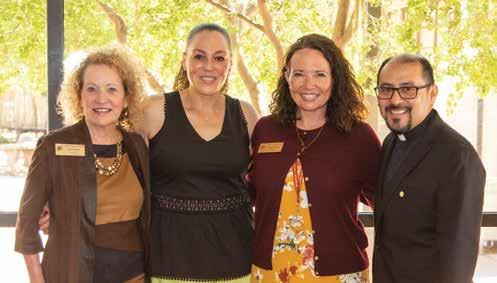
3 minute read
Catching up with the Quigleys
Carolyn Quigley ’04
Describe your educational journey after Salpointe: I attended the University of Arizona where I studied Human Physiology and Spanish. I then attended medical school at Loyola University of Chicago Stritch School of Medicine, where I did a global health fellowship working at a primary care clinic in rural Bolivia. I completed my family medicine residency training at the University of Arizona.
Advertisement
What path did your career take? I always planned to be a physician and was very fortunate to be able to pursue this career path. I work at El Rio Health in Tucson in adult primary care, pediatrics, breastfeeding medicine and teen reproductive and sexual health.
How did Salpointe make a difference in your life? Salpointe prepared me well for my future educational and personal endeavors. I formed lifelong friendships and I am still best friends with my high school crew! We have seen each other through university, grad school, first jobs, sickness, marriage, kids and all the ups and downs of life. There is no doubt I was well prepared from the educational side, but Salpointe’s emphasis on nourishing all parts of one’s life really stuck with me and has kept me afloat during the more stressful years of my medical training. Lastly, Salpointe’s emphasis on service was at the root of my desire to go into medicine and energizes my daily life as a mother, wife and doctor.
Kaitlyn Quigley ’05
Describe your educational journey after Salpointe: I attended Loyola College in Maryland, where I studied political science and Spanish. I spent a year with the Jesuit Volunteer Corps in San Francisco and then went to law school at Northwestern University in Chicago.
What path did your career take? After law school, I served as a law clerk to a justice of the Arizona Supreme Court and a judge of the United States District Court for the District of Arizona and then worked as a litigation associate for a large law firm in Chicago. I then spent about five years at Legal Aid Chicago, where I staffed and later managed medical-legal partnership projects. During the pandemic, I moved back to Tucson, and I now work in the career office of the law school at the University of Arizona.
How did Salpointe make a difference in your life? I can think of three main ways that Salpointe made a difference in my life:
1) Spanish: I studied AP Spanish with Profe Joe Neilson and Mr. John Morgan and entered college with strong language skills, allowing me to study abroad in Buenos Aires and El Salvador. Spanish language ability later proved critical for my work in legal aid, where I served many monolingual Spanish speakers.
2) Humanities: My experience with the Humanities Program at Salpointe made me want to study at a liberal arts college. I arrived at Loyola as a strong writer and analyzer, which was important for my academic success in college
(and later in law school). 3) Social Justice: Mr. Becker’s social justice class in many ways was the launch pad for my journey to Loyola, Casa de la Solidaridad in El Salvador, Jesuit Volunteer Corps and law school where I went with the intent to become a legal aid lawyer.
Colleen Quigley ’08
Describe your educational journey after Salpointe:
I completed my bachelor’s degree in French and Spanish from Loyola University in Chicago and earned a master’s degree in Foreign Service from Georgetown University.
What path did your career take? I always knew I wanted my career to involve something international, and what that has meant to me has evolved over the years. When I finished college, I worked in education, teaching bilingual primary school in Chicago with Teach For America and English in Nicaragua with the Jesuit Volunteer Corps. After a few more years teaching and earning a master’s degree, I transitioned to service with the federal government, where I now work as a Foreign Service Officer (or diplomat) for the Department of State. How did Salpointe make a difference in your life? Salpointe’s values of community, respect and justice have stayed with me throughout my education and career. These values inform my decision making, help me overcome challenges and remind me how I strive to treat others in every interaction.
James Quigley ’14
Describe your educational journey after Salpointe:
I attended the Barrett Honors College at Arizona State University and graduated with a Bachelor of Science in Software Engineering with a Minor in Business.
What path did your career take? During college I interned at Photon Engineering and Raytheon, and worked at Reztech, a small web development consulting company in Tempe. After graduation, I accepted an offer at Axosoft, a company that makes productivity tools for software developers. At Axosoft I was a DevOps Engineer, but also quickly took on the role of IT Director. I have continued to work in tech engineering and now serve as the Staff Site Reliability Engineer at Oscar Health in New York City.
How did Salpointe make a difference in your life? I had some amazing teachers at Salpointe who definitely helped shape who I am! People like Marco Enriquez, David Garwacki and many others pushed and encouraged me. I also think the well-rounded curriculum was great for me. I find myself feeling privileged that Salpointe had great arts and extra curricular programs, such as choir and sports. It is amazing that I could have a full day of school, do choir practice and then go to the on-site sports medicine doctor to get treatment before my soccer game. That’s not an option at many colleges, much less high schools.






